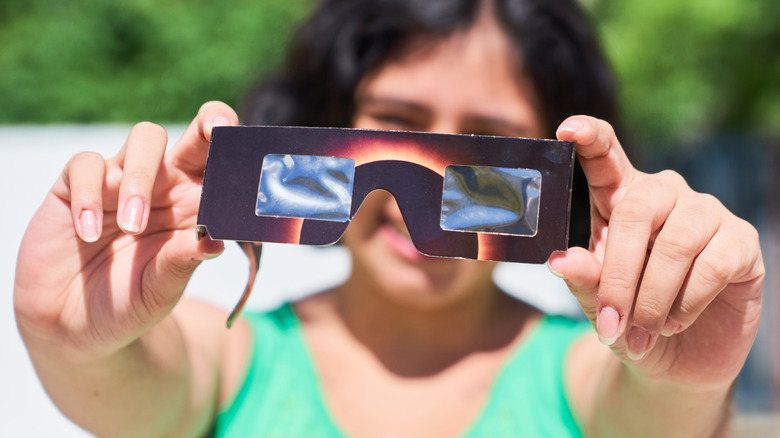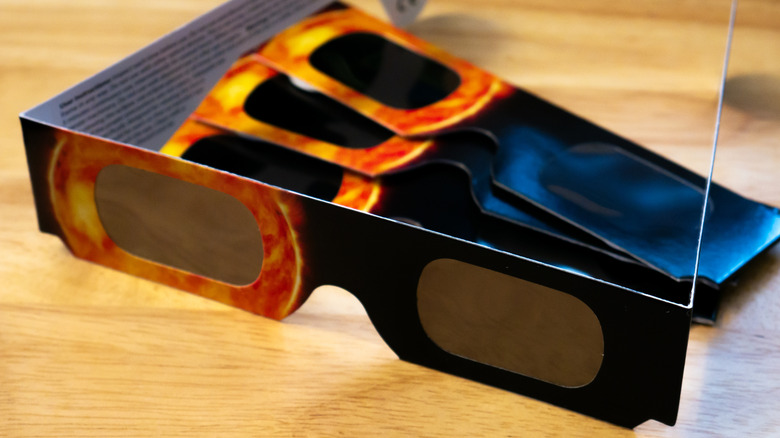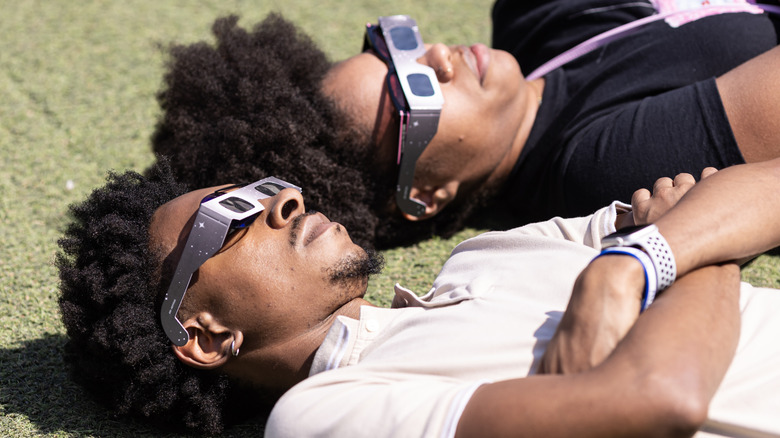How To Easily Tell If Solar Eclipse Glasses Are Fake
Almost everyone knows that you're not supposed to look directly at a solar eclipse without the proper eyewear. Looking at the intense sun normally can damage your eyes, but during a solar eclipse, it's even worse. The sun can cause retinal burns, known as solar retinopathy.
Since the retina has no sensitivity to pain, damage may not become apparent for hours. Sun damage is bad for cameras, too, so don't try to take a picture of a solar eclipse with your phone or camera. That also helps illustrate why you need to protect your eyes from celestial viewings with something like solar eclipse glasses. If the sun can damage a camera sensor it can damage your retinas. However, not all solar eyewear are created equal. In recent years, it's become important to learn how to spot fake solar eclipse glasses.
For the 2024 North American total solar eclipse, the American Astronomical Society issued a warning about fake eclipse glasses. They stated that fake glasses are "polluting the marketplace," making it difficult to find legitimate safety gear. Moreover, because solar viewers come in a wide variety of styles, from standard over-the-ear glasses to cardboard frames, it can make spotting the real thing even more challenging. Luckily, there are a few simple ways to make spotting fake solar eclipse glasses easy. Putting them to the test under safe conditions is the best method, as fakes will show themselves in reflection and light source testing.
Understanding the difference: Counterfeits versus fakes
Before we talk about spotting fake eclipse glasses, you must understand there's a major difference in fakes that show up on the market. There are counterfeits, which are particularly insidious, and there are general fakes.
Counterfeits are designed to look like legitimate glasses, and often copy or clone genuine designs from a well-known manufacturer. They include the necessary safety labels and warnings, like the real eclipse glasses would. At a glance, you'd have no idea they're not authentic right down to the "Mfg. by: Company" disclaimer. On the other hand, fakes, simply do not work to block out harmful UV rays and sunlight. A unique distinction to make here is that counterfeits can also be fakes.
Fake solar eclipse glasses may not be trying to mimic a real provider; the lenses haven't been treated, and they simply don't work as advertised. That could lead to retinal damage if you use them in a real setting, so they're still dangerous. Counterfeits, on the other hand, are made to look identical to the real thing. They have the necessary labels and disclaimers, the lenses are tinted, and they may even be sold alongside real glasses. That's why you should always buy your glasses from vetted stores. The American Astronomical Society has a list of reputable vendors to shop. The next total solar eclipse isn't expected until 2026, so there's time.
How to easily spot fake solar eclipse glasses
Authentic solar eclipse glasses have a warning that lists safety compliance, particularly the ISO 1231202 Standard. Typically, if you see that label, the glasses are okay, but not always. Counterfeits that mimic the real thing also include these details, so the best way to spot fake solar eclipse glasses quickly is to put them to the test under safe conditions.
-
Put the glasses on while inside and make sure the filters work. You shouldn't be able to see anything except very bright or close sources of light. If you see objects or surroundings, however faint, the glasses are likely fake.
-
On a sunny day, wear the glasses outside. Don't look directly at the sun, but look around and search for reflections of it, which are bright enough for this test. If you can't see anything except the light reflection, the glasses are okay. If you see anything else, they're probably fake.
-
If the other methods seem to check out, quickly glance at the sun. It should not appear normal: Instead, you'll see a bright circular disk, possibly tinted a different color. In addition, the sun should not be very bright, and you should not have to squint.
If the glasses pass all tests, that's a good sign. It doesn't always mean they're safe, but if you bought them from a reputable vendor, you should be alright. Power companies, on the other hand, may have a really bad day when the next eclipse happens.


